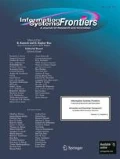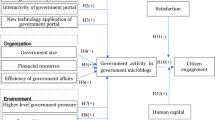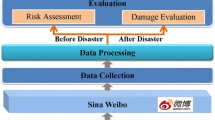Abstract
Microblogging has become a crucial channel for e-governments to interact with the public and has been evolving as a powerful and promising tool to address emergency management. The operational performance of an e-government microblog under emergencies plays a key role in shaping the e-government’s overall performance. This study creatively proposes a novel multi-indicator system for evaluating this operational performance in the life cycles of emergencies and applies these multiple indicators in a data envelopment analysis method to establish an evaluation model. Twenty-four e-government microblogs concentrating on the bus crash emergency in the Wanzhou district of Chongqing city are evaluated by this model. The evaluation results indicate that the proposed multi-indicator system and evaluation model are feasible and effective. This study’s findings indicate that e-governments should be encouraged to attach great importance to microblogs, pay direct attention to emergencies during their life cycles, concentrate on multi-stage evaluations to discover their performance changes across the “turning points” of emergencies, and collaborate with superior or subordinate e-governments to improve their microblogs’ operational performances.


Similar content being viewed by others
Notes
Government Affairs Index Microblog Impact Report published in 2018 People’s Daily, http://yuqing.people.com.cn/n1/2017/0119/c209043-29,036,185.html.
References
Abedin, B., & Babar, A. (2018). Institutional vs. non-institutional use of social media during emergency response: a case of Twitter in 2014 Australian Bush Fire. Information Systems Frontiers, 20(4), 729–740
Aedo, I., Diaz, P., Carroll, J. M., Convertino, G., & Rosson, M. B. (2010). End-user oriented strategies to facilitate multi-organizational adoption of emergency management information systems. Information Processing & Management, 46(1), 11–21
Aharony, N. (2012). Twitter use by three political leaders: An exploratory analysis. Online Information Review, 36(4), 587–603
Bai, Y. F., & Wang, X. Y. (2018). General public budget performance evaluation of Beijing district government based on DEA model - a case study of Fengtai district. Review of Economic Research, 2897(49), 51–57
Bao, M. L., Liu, R., Zou, K., & Zhou, J. (2015). The study on government microblog service quality evaluation index system. Journal of Modern Information, 35(9), 93–97 + 110
Bertot, J. C., Jaeger, P. T., & Hansen, D. (2012). The impact of polices on government social media usage: issues, challenges, and recommendations. Government Information Quarterly, 29(1), 30–40
Bhuvaneswari, A., & Valliyammai, C. (2019). Social IoT-enabled emergency event detection framework using geo-tagged microblogs and crowdsourced photographs. Advances in Intelligent Systems and Computing, 814, 151–162
Cao, J. F., & Zhang, H. L. (2017). Empirical analysis of the innovation performance evaluation of local governments in China based on the improved DEA model. Agro Food Industry Hi-Tech, 28(1), 2185–2189
Charnes, A., Cooper, W. W., & Rhodes, E. (1978). Measuring the efficiency of decision-making units. European Journal of Operational Research, 2(6), 429–444
Chen, M. L., Qiu, T. T., & Xie, Y. (2014). Scientific construction of the evaluation index system for microbloggers’ influence. Journal of Zhejiang University (Humanities and Social Sciences), 44(2), 53–63
Cook, W. D., Tone, K., & Zhu, J. (2014). Data envelopment analysis: Prior to choosing a model. Omega, 44, 1–4
Dan, Y. (2008). Evaluation of the performance of e-government based on data envelopment analysis. In Proceedings of the 5th International Conference on Innovation & Management (Vols. I and II, pp. 1451–1455)
Derczynski, L., Maynard, D., Rizzo, G., van Erp, M., Gorrell, G., Troncy, R., Petrak, J., & Bontcheva, K. (2015). Analysis of named entity recognition and linking for tweets. Information Processing & Management, 51(2), 32–49
Duan, Y. R. (2006). Data envelopment analysis - theory and application. Shanghai Science Popularization Publishing House
Fu, G. H. (2016). FCA based ontology development for data integration. Information Processing & Management, 52(5), 765–782
General Offices of the NPC Standing Committee of China. (2008). Emergency response law of the People’s Republic of China
Ghosh, S., Ghosh, K., Ganguly, D., Chakraborty, T., Jones, G. J. F., Moens, M. F., & Imran, M. (2018). Exploitation of social media for emergency relief and preparedness: Recent research and trends. Information Systems Frontiers, 20(5), 901–907
Guo, G. J. (2016). Operational envelopment analysis efficiency research of provincial government affairs micro-blogs based on data envelopment analysis. Journal of Modern Information, 36(11), 94–98 + 131
Hajikhani, A. (2017). Efficiency assessment of the social capital capacity on entrepreneurial activity: A perspective driven from social media. In Proceedings of 2017 Portland International Conference on Management of Engineering and Technology (pp. 1–10)
Hao, X. L., Zheng, D. Q., Zeng, Q. F., & Fan, W. G. (2016). How to strengthen the social media interactivity of e-government. Online Information Review, 40(1), 79–96
Hong, L. Z., Fu, C., Wu, J. H., & Frias-Martinez, V. (2018). Information needs and communication gaps between citizens and local governments online during natural disasters. Information Systems Frontiers, 20(5), 1027–1039
Hsieh, P. H., Huang, C. S., & Yen, D. C. (2013). Assessing web services of emerging economies in an Eastern country - Taiwan’s e-government. Government Information Quarterly, 30(3), 267–276
Huang, H., & Weng, Z. H. (2016). The environment, measures and systems of government image construction in the context of mobile internet. Chinese Journal of Journalism & Communication, 38(8), 74–91
Lai, S. P. (2013). Accountability, inertia and publicity: a study of local government behavior based on ninety-seven public crisis cases. Journal of Public Management, 10(02), 18–27 + 138
Lee, S., & Lee, H. (2015). Measuring and comparing the R&D performance of government research institutes: A bottom-up data envelopment analysis approach. Journal of Informetrics, 9(4), 942–953
Li, L. F., Zhang, Q. P., Tian, J., & Wang, H. L. (2018). Characterizing information propagation patterns in emergencies: A case study with Yiliang Earthquake. International Journal of Information Management, 38(1), 34–41
Li, S. Y., Liu, Z. X., & Li, Y. L. (2020). Temporal and spatial evolution of online public sentiment on emergencies. Information Processing & Management, 57(2), 102177
Li, Y. X., & Zhang, H. S. (2015). Research on operational performances of e-government microblogs based on microblogs’ characteristics: A case of @Shanghai Release, E-government, (1), 52–59
Lin, M. I., Lee, Y. D., & Ho, T. N. (2011). Applying integrated DEA/AHP to evaluate the economic performance of local governments in China. European Journal of Operational Research, 209(2), 129–140
Ling, S., Li, W. M., & Liu, X. Z. (2019). Research on the information game model of environmental emergency accident in the context of social media. Journal of Intelligence, 38(02), 153–161
Liu, C. C., Wang, T. Y., Yu, G. Z., & Using, A. H. P. (2019). DEA and MPI for governmental research institution performance evaluation. Applied Economics, 51(10), 983–994
Liu, F., & Xu, D. M. (2018). Social roles and consequences in using social media in disasters: a structurational perspective. Information Systems Frontiers, 20(4), 693–711
Liu, J. S., Lu, L. Y. Y., & Lu, W. M. (2016). Research fronts in data envelopment analysis. Omega, 58, 33–45
Liu, M. F., Tang, H. X. (2009). Efficiency evaluation of regional e-government services in china based on relative efficiency. In Proceedings of 2009 International Conference on Management of E-commerce and E-government (pp. 81–86)
Liu, Y., Liu, J. W., Zhang, Z. H., Zhang, L. Q. (2018). Study of county level government’s e-government efficiency evaluation in Sichuan province based on DEA. In Proceedings of the Eleventh International Conference on Management Science and Engineering Management (pp. 398–4100)
Martínez-Rojas, M., Pardo-Ferreira, M. D., & Rubio-Romero, J. C. (2018). Twitter as a tool for the management and analysis of emergency situations: A systematic literature review. International Journal of Information Management, 43, 196–208
Mirbabaie, M., & Marx, J. (2020). ‘Breaking’ news: Uncovering sense-breaking patterns in social media crisis communication during the 2017 Manchester bombing. Behaviour & Information Technology, 39(3), 252–266
Narbon-Perpina, I., Balaguer-Coll, M., & Tortosa-Ausina, E. (2019). Evaluating local government performance in times of crisis. Local Government Studies, 45(1), 64–100
Ogie, R. I., Forehead, H., Clarke, R. J., & Perez, P. (2018). Participation patterns and reliability of human sensing in crowd-sourced disaster management. Information Systems Frontiers, 20(4), 713–728
Panagiotopoulos, P., Barnett, J., Bigdeli, A. Z., & Sams, S. (2016). Social media in emergency management: Twitter as a tool for communicating risks to the public. Technological Forecasting and Social Change, 111, 86–96
Pandey, A. C., Rajpoot, D. S., & Saraswat, M. (2017). Twitter sentiment analysis using hybrid cuckoo search method. Information Processing & Management, 53(4), 764–779
Sarkar, S., Mitsui, M., Liu, J. Q., & Shah, C. (2019). Implicit information need as explicit problems, help, and behavioral signals. Information Processing & Management, 57(2), 102069
Sha, Y. Z., Wang, Y., Liu, H. J., & Kong, L. G. (2009). Mapping of government performance management: The trend of research fronts. Journal of Public Management, 6(3), 102–110 + 127
Shan, S. Q., Zhao, F., Wei, Y. G., & Liu, M. N. (2019). Disaster management 2.0: A real-time disaster damage assessment model based on mobile social media data - a case study of Weibo (Chinese Twitter). Safety Science, 115, 393–413
Stephenson, J., Vaganay, M., Coon, D., Cameron, R., & Hewitt, N. (2018). The role of Facebook and Twitter as organisational communication platforms in relation to flood events in Northern Ireland. Journal of Flood Risk Management, 11(3), 339–350
Tang, X. L., Wang, J. Q., Zhang, B., & Zhang, L. X. (2017). Application of the DEA on the performance evaluation of the agricultural support policy in China. Agricultural Economics (Zemědělská ekonomika), 63(11), 510–523
Tang, Z. W., Han, X., Gong, Z. P., Jiang, P., Liu, J. W., Zhang, C. H. (2015). An empirical research of e-government efficiency evaluation of the local government in Chengdu based on DEA. In Proceedings of International Conference on Advanced Management Science and Information Engineering (pp. 316–323)
Wang, C., Zhou, Z. Y., Jin, X. L., Fang, Y. L., & Lee, M. K. O. (2017). The influence of affective cues on positive emotion in predicting instant information sharing on microblogs: Gender as a moderator. Information Processing & Management, 53(3), 721–734
Wang, G. H., Wei, C. R., Yang, T. F., Zhong, S. Y., & Wang, G. (2015). A study on the response of governmental weibo to internet public opinion crisis in emergency - a case study of @Shanghai Announcement in Shanghai Stampede. Journal of Intelligence, 34(4), 65–70 + 53
Wang, K., Yu, S. W., & Zhang, W. (2013). China’s regional energy and environmental efficiency: A DEA window analysis based dynamic evaluation. Mathematical and Computer Modelling, 58(5–6), 1117–1127
Wu, J., & Guo, D. (2015). Measuring e-government performance of provincial government website in China with slacks-based efficiency measurement. Technological Forecasting and Social Change, 96, 25–31
Xiao, W. B. (2010). The improved information environment as a key rationale for freedom of information reform in China. Information Polity, 15(3), 177–187
Xie, G. Y., & Rong, T. (2011). Generation and evolution mechanisms of public opinion in microblog and guide strategy for public opinion, Modern Communication. Journal of Communication University of China, (5), 70–74
Yang, D. Q., & Pei, J. Y. (2009). Study on logistics performance evaluation based on DEA-AHP method. Operations Research and Management Science, 18(05), 81–86
Zhang, M., Wu, Y. S., & Huo, C. G. (2015). Performance evaluation and improvement path selection of provincial government microblog operation in China. Research on Library Science, (17), 22–28
Zhang, Q., Li, X., & Huang, Y. (2012). A new fuzzy risk evaluation method for uncertain network public sentiment emergency. Springer
Zhang, S., Yu, D. J., Wang, Y., & Zhang, W. Y. (2014). Evaluation about the performance of e-government based on interval-valued intuitionistic fuzzy set. Scientific World Journal, 234241
Zhang, W., Wang, M., & Zhu, Y. C. (2020). Does government information release really matter in regulating contagion-evolution of negative emotion during public emergencies? From the perspective of cognitive big data analytics. International Journal of Information Management, 50, 498–514
Zhang, Y., & Ren, F. B. (2017). Evaluation of network communication power of think tank based on AHP and entropy method. Information Science, 35(3), 110–116
Zhao, A. M., & Cao, G. Q. (2014). Positive study on evaluation and comparison of government affairs micro-blog influence: Based on factor analysis and cluster analysis. Journal of Intelligence, 33(3), 107–112
Zhao, X. Y., Zhan, M. Q., & Liu, B. F. (2018). Disentangling social media influence in crises: Testing a four-factor model of social media influence with large data. Public Relations Review, 44(4), 549–561
Acknowledgements
This work was supported by the National Natural Science Foundation, China (No. 71771195, No. 71401153). Many thanks to the local municipal and district people’s governments, public security bureaus (PSBs) and transport agencies for their help during online mining and offline survey for data collection in the case study.
Author information
Authors and Affiliations
Corresponding author
Additional information
Publisher’s Note
Springer Nature remains neutral with regard to jurisdictional claims in published maps and institutional affiliations.
Rights and permissions
About this article
Cite this article
Long, Q., Song, K. Operational Performance Evaluation of E-government Microblogs Under Emergencies Based on a DEA Method. Inf Syst Front 24, 1–18 (2022). https://doi.org/10.1007/s10796-021-10171-3
Accepted:
Published:
Issue Date:
DOI: https://doi.org/10.1007/s10796-021-10171-3




